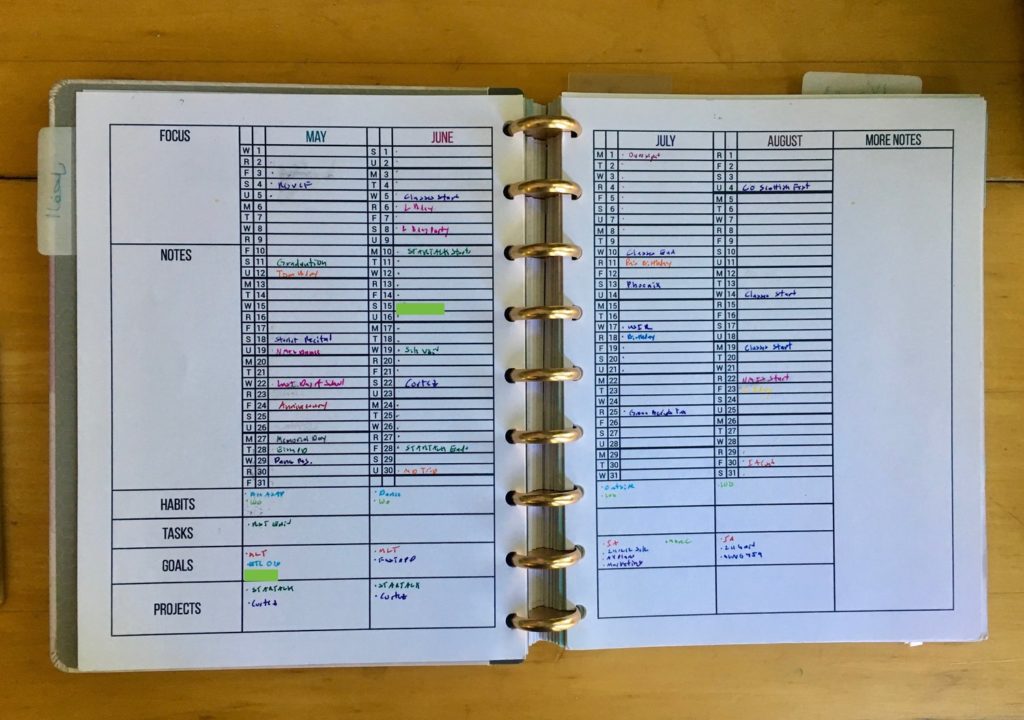As I’ve mentioned before, my larger scale unit of planning is the semester, and I’ve discussed how I make my semester plan for Fall and Spring. At the end of each semester, before making the plan, I also conduct an end of semester review, looking at what went well and what didn’t, and what I want to focus on or change in the following semester. I’ll share my Summer plan at the end of this post (yes, I plan summers too!), but before that I thought I’d discuss how I do my end of semester review.
Reflection Questions
First, I start with my standard reflection questions, which I also use for reflecting with students and teachers
1) What did I accomplish this semester? How can I magnify this?
2) What can I improve? How can I improve it?
When I list my accomplishments, I do it from memory first, and then go back and look at my monthly reviews to see what I missed. Usually, it’s about 50% of the things I did, which is one reason I like keeping track of everything—once I see the notes I remember that I made those revisions, or organized that part of my house, or completed that service project, but without going back my sense of what I’ve accomplished is at about 50%.
After this, I move on to the next two questions:
1) What do I want more of? How can I get it?
2) What do I want to let go of? How can I let it go?
I should probably consider renaming these the space and stress questions, since it seems like mental and physical space is always the answer to the first question, and stress is always the answer to the second. There are some variations, such as wanting more sleep, or wanting to let go of rejections, but even these related to the first (quality sleep=more mental space and rejections=stress). While it is sometimes frustrating to always feel like I have the same answers, I do feel like there is incremental improvement, and some of these things (like my kids sleeping through the night) just take a long time to improve.
Goals Review
Next, I look at my goals, and ask the following questions:
1) Which goals did I accomplish? Why?
2) Which goals did I not accomplish? Why?
3) Thoughts moving forward . . .
Again, these questions seem to have consistent answers, which is itself enlightening. Goals completed tend to be planned into my schedule and have specific deadlines, often involving other people like editors or students (which is why they get into my schedule first). Goals not accomplished are those that can wait longer, and thus get bumped when I run out of time. While again, always having the same answers might seem like a lack of progress, I’ve definitely gotten better at realistically estimating what can happen in a semester, and my ratio of goals accomplished to unaccomplished has gone up (by having fewer goals overall).
Areas of Life Review
Finally, I do what I call an areas of life review. When I reflect on my life, I think of it in four broad categories with subcategories. I rank each subcategory, and then ask what can I improve? and what should I do next?
Career: This includes my academic career (divided into research, teaching, and service/admin) as well as my dance career (this is more between a passion project and heavy volunteer load than a career, but still very important to me!). I usually score myself fairly high here, although balancing between the three components of my academic job is always a challenge.
Relationships: These include relationships across all areas of my life. Family and friends are the obvious ones, but I also include relationships related to my academic and dance careers. This category is usually my biggest challenge.
Environment: This is the physical and digital spaces I am surrounded by, so things like physical and digital organization of my home and work spaces, finances, and systems for managing time and space. This category tends to score high in some categories and low in others, depending on what I’ve prioritized this semester.
Self: This includes things related to the health of my mind, body, and spirit, like exercise, nutrition, sleep, learning, creativity, etc. This category tends to score medium across all the categories, except low on sleep.
Planning for the Next Semester
Once I’ve done this reflecting, I then brainstorm potential goals and areas of improvement for the next semester, and then map them onto a calendar to see how realistic I’m being. Then I cut a few, and make my semester plan. Below, you can see my semester plan for the Summer. I’ll see how it goes!

